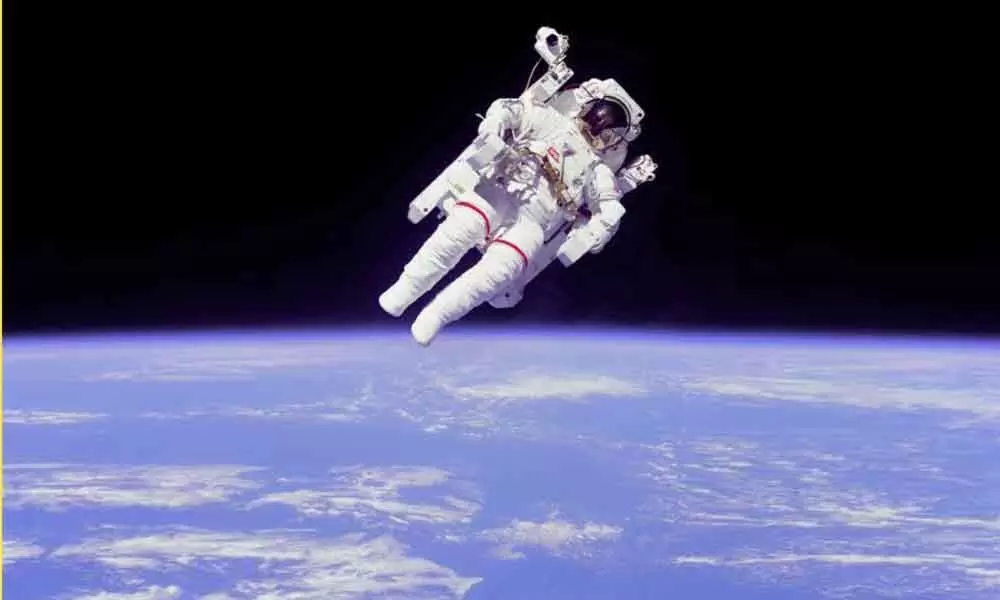Live
- Pawan Kalyan's Visit to Penamaluru Constituency Today
- Kadapa Municipal Corporation Meeting: Heavy Police Deployment and Section 144 Imposed
- Mandhana, Renuka blow away Windies in first ODI
- Heavy rush for Bhavani Deeksha Viramana continues
- Steps taken to ensure accommodation to common devotees says TTD EO J Syamala Rao
- CRDA invites tenders for ‘Happy Nest’ township
- PD Act invoked against red sanders smuggler
- Meghalaya scrape past Goa to secure QF berth
- India lift inaugural U19 Women’s Asia Cup
- No place for Stokes as Root returns to England’s squad for India ODIs and CT
Just In
Space travel can cause leaky gut in astronauts; study


Space travel can disrupt the functioning of the robust cell barrier that lines our intestines to prevent bacteria, fungi, and viruses from invading the rest of our bodies, according to a study.
Space travel can disrupt the functioning of the robust cell barrier that lines our intestines to prevent bacteria, fungi, and viruses from invading the rest of our bodies, according to a study.
Researchers from the University of California (UC), Riverside in the US noted that the microgravity environment encountered in space has profound effects on human physiology, leading to clinical symptoms and illnesses including gastroenteritis. They suggest that this can greatly increase the risk of infections, and chronic inflammatory conditions such as inflammatory bowel disease, celiac disease, Type 1 diabetes, and liver disease. Previous studies have shown that microgravity weakens the human immune system, in addition to increasing the intestinal disease-causing ability of food-borne bacteria such as salmonella.
The study, published in the journal Scientific Reports, has implications for understanding the effects of space travel on intestinal function of astronauts in space, as well as their capability to withstand the effects of agents that compromise intestinal epithelial barrier function following their return to Earth. "Our study shows for the first time that a microgravity environment makes epithelial cells less able to resist the effects of an agent that weakens the barrier properties of these cells," said Declan McCole, a professor at UC Riverside, who led the study. "Importantly, we observed that this defect was retained up to 14 days after removal from the microgravity environment," McCole said in a statement.
The permeability-inducing agent the team chose to investigate was acetaldehyde, an alcohol metabolite. McCole explained that alcohol compromises barrier function and increases gastrointestinal permeability in normal subjects and in patients with alcoholic liver disease. The barrier function of the intestinal epithelium, McCole added, is critical for maintaining a healthy intestine. When disrupted, it can lead to increased permeability or leakiness, he said. The researchers used a rotating wall vessel -- a bioreactor that maintains cells in a controlled rotation environment that simulates near weightlessness - to examine the impact of simulated microgravity on cultured intestinal epithelial cells.
Following culture for 18 days in the vessel, the team discovered intestinal epithelial cells showed delayed formation of junctions which connect individual epithelial cells, and are necessary for maintaining impermeability. The rotating wall vessel also produces an altered pattern of the junction assembly that is retained up to 14 days after the intestinal epithelial cells were removed from the vessel. "Our study is the first to investigate if functional changes to epithelial cell barrier properties are sustained over time following removal from a simulated microgravity environment," McCole said. "Our work can inform long-term space travel and colonisation where exposure to a food-borne pathogen may result in a more severe pathology than on Earth," he added.

© 2024 Hyderabad Media House Limited/The Hans India. All rights reserved. Powered by hocalwire.com






